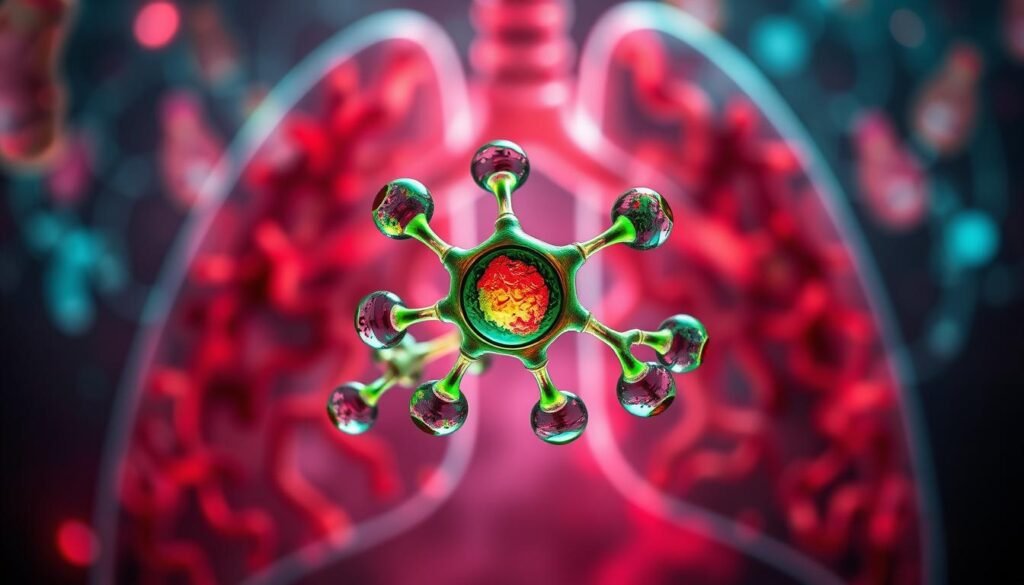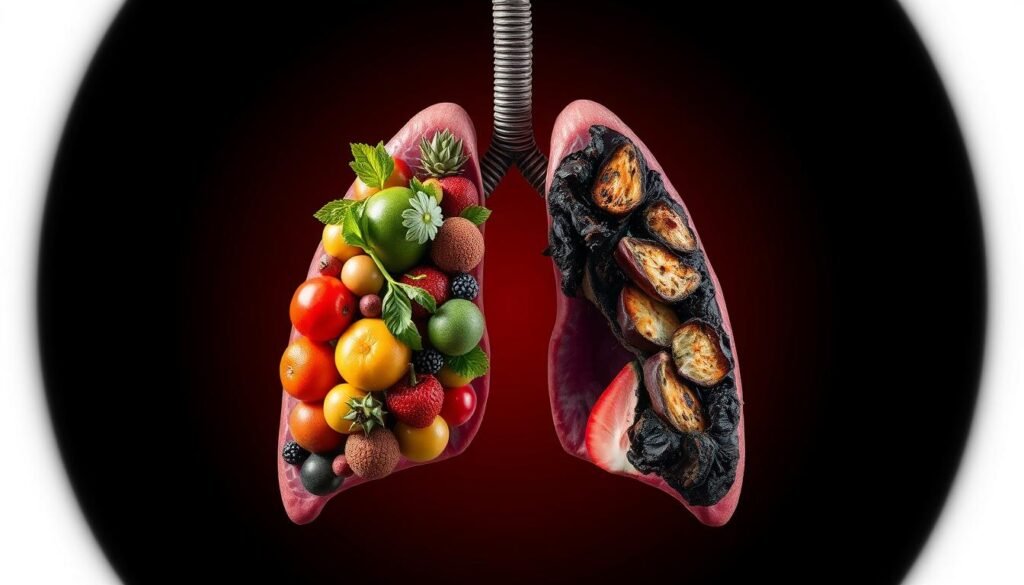In the United States, around 234,580 new cases of lung cancer are expected in 2024. This shows the pressing need for cancer prevention. Recent research has looked into how vitamin B affects lung cancer risk. While vitamins are generally good for health, high doses of some B vitamins might raise lung cancer risk. It is key to understand how these vitamins influence cancer prevention efforts.
The relationship between vitamin B and lung cancer has shown different effects for men and women. For men, high levels of vitamins B6 and B12 increase the risk of lung cancer. This has led to questions about how diet and vitamin use can impact lung cancer risk. The goal of this article is to shed light on the potential risks and protective effects of these vitamins. It highlights the importance of making informed choices about nutrition and supplements.
Key Takeaways
- Lung cancer diagnoses are projected to exceed 234,580 in the U.S. in 2024.
- High doses of vitamin B6 and B12 are associated with an increased risk of lung cancer, particularly in men.
- Studies indicate a need for more research to establish causation regarding B vitamins and lung cancer.
- Focusing on a balanced diet may be more beneficial than relying on vitamin supplements.
- Antioxidants such as vitamins C and E may assist in cancer prevention efforts by stabilizing proteins around tumors.
- Understanding individual health needs is essential; consult with healthcare professionals regarding supplements.
Introduction to Lung Cancer Statistics
Lung cancer is a major health problem worldwide, being a top cause of cancer deaths. In the U.S., about 228,220 new lung cancer cases were noted in 2020. This disease led to roughly 135,720 deaths, 23% of all cancer deaths in America.
The survival rate for lung cancer over 5 years is around 20%. This low rate shows we need better prevention and treatment. The global survival rate is lower, showing the importance of dealing with lung cancer everywhere.
It’s vital to spread the word about lung cancer. As experts dig into its causes and risks, knowing current stats can help. This understanding can guide the way towards better prevention and treatments for the future.
The Role of Nutrients in Cancer Prevention
Nutrients are crucial in fighting cancer, focusing on how they impact health. Vitamins from the B complex group have been studied for their roles in lowering cancer risk. They may influence DNA methylation, oxidative stress, and inflammation, which link to cancer.
Eating a diet full of nutrient-rich foods is essential for cancer prevention. Key vitamins help keep cells healthy, reducing lung cancer chances. Fruits and vegetables boost the immune system and offer more protection.
Not getting enough nutrients can weaken the immune system and cause weight loss. Taking dietary supplements can help, especially if diets lack certain nutrients. It’s vital for everyone, especially those at risk, to look at food and supplements to improve health and lower cancer risks.
| Nutrient | Recommended Daily Intake (mg/μg) | Sources | Role in Cancer Prevention |
|---|---|---|---|
| B1 (Thiamine) | 1.1–1.2 mg | Whole grains, legumes, nuts | Energy production, supports metabolism |
| B2 (Riboflavin) | 1.0–1.3 mg | Dairy products, eggs, green vegetables | Antioxidant effects, supports cell growth |
| B3 (Niacin) | 11–12 mg | Poultry, fish, whole wheat bread | Enhances DNA repair, reduces oxidative stress |
| B5 (Pantothenic Acid) | 5 mg | Eggs, fish, dairy, whole grains | Supports adrenal function, hormone production |
| B6 (Pyridoxine) | 1.3–1.7 mg | Poultry, fish, potatoes, non-citrus fruits | Aids in amino acid metabolism, immune function |
| B7 (Biotin) | 30 μg | Egg yolks, nuts, soybeans | Healthy cell growth, metabolic processes |
| B9 (Folate) | 400 μg | Leafy greens, legumes, citrus fruits | DNA synthesis, repair, reduces cancer cell formation |
| B12 (Cobalamin) | 2.4 μg | Meat, dairy, fortified cereals | Supports nerve health, reduces homocysteine levels |
Understanding Vitamin B Complex
The vitamin B complex is a group of eight essential water-soluble vitamins. These vitamins are crucial for our body’s functions. They include B1 (thiamine), B2 (riboflavin), B3 (niacin), B5 (pantothenic acid), B6 (pyridoxine), B7 (biotin), B9 (folate), and B12 (cobalamin). Each plays a big role in our health.
Vitamin B has many benefits. It helps our bodies make energy, create red blood cells, and keeps our nerves working right. But, recent research has shown some concerns. Studies suggest taking too much vitamin B6 and B12 might increase lung cancer risk in men, especially if they smoke.
Studies have found that men taking large amounts of B6 and B12 face a higher risk of lung cancer. This might be because of how these vitamins work in our bodies. It’s important to think carefully about taking vitamin B supplements, especially for smokers.
| Vitamin | Recommended Daily Allowance (RDA) | Potential Risk Associated with High Dose in Smokers |
|---|---|---|
| B6 (Pyridoxine) | 1.3-2.0 mg | 3.71 times increased risk for lung cancer |
| B12 (Cobalamin) | 2.4 mcg | 2.93 times increased risk for lung cancer |
| B9 (Folate) | 400 mcg | No significant risk increase noted |
Vitamin B and Lung Cancer: Latest Research Findings
Recent research studies have shown a worrying link between vitamin B12 and lung cancer, mainly in some groups. In particular, men who take a lot of vitamin B6 and B12 supplements might have a much higher risk. A big study with over 77,000 adults confirmed these results.
Recent Studies Linking Vitamin B12 to Lung Cancer Risk
One big study found that men using a lot of vitamins B6 and B12 faced nearly double the risk of lung cancer. For those who smoke, the risk was even larger, soaring to three to four times higher. The most risk was seen in men taking more than 20 milligrams of B6 daily and over 55 micrograms of B12, showing an 82 percent and 98 percent increase in lung cancer risk, respectively.
While most people in the U.S. get enough vitamin B6 and B12 from what they eat, some might need extra. This includes older people and vegetarians. But when it comes to vitamin B12 and lung cancer, it’s vital to be careful with how much you take, especially for smokers. Studies warn that taking more supplements than recommended could be dangerous.
Potential Mechanism of Action
The exact reasons why high vitamin B12 intake might increase cancer risk aren’t clear yet. Some scientists think it could mess with DNA methylation and change one-carbon metabolism. This might up the risk seen. More research is being done to understand how high-dose vitamin B supplements affect lung cancer risk, focusing on different groups.

Discussing vitamin B12 and lung cancer broadens the conversation on food and cancer prevention. It’s crucial to keep investigating these findings, especially for groups that might be more at risk.
The Impact of Antioxidants on Respiratory Health
Antioxidants are key in promoting lung health and might help prevent lung cancer. Studies show that eating foods rich in antioxidants can fight off oxidative stress and inflammation. These are linked to lung diseases, including cancer.
Vitamins C and E are important antioxidants. They support cell health along with B vitamins. Eating these vitamins daily can improve health and help prevent lung cancer.
People eating more antioxidants tend to have better lung health. Those with high antioxidant diets show 19% less chronic lung disease. This shows eating antioxidants can improve lung health.
Research also links specific antioxidants with reduced lung cancer risk. High levels of retinol reduce the risk of certain lung cancers. It’s key to understand these connections to prevent lung cancer.
Adding foods high in antioxidants to your diet can help prevent lung cancer. It also boosts lung health as part of a healthy lifestyle.
The Connection Between Nutrient Deficiency and Lung Cancer
Lacking nutrients can really increase the chance of getting lung cancer. There’s evidence that not having enough of certain B vitamins can hurt our body’s ability to fix DNA and fight off disease. These problems can make it easier for cancer to start in the lungs.
In a big study with 40,000 people from ten countries in Europe, the ones with more Vitamin B6 and Methionine had a much lower chance of lung cancer—almost half as much. Out of everyone studied, 899 folks got lung cancer, and 408 of them didn’t have enough of these key nutrients in their blood.

However, taking too many vitamins, especially in high doses, might not be a good idea. Studies show increased lung cancer risk, 30% to 40% higher, for men taking lots of Vitamins B6 and B12. For smokers, this risk was even more noticeable. They were three to four times more likely to get lung cancer if they had high levels of these vitamins.
The info shows a tricky balance between not having enough vitamins and taking too many. Since smoking causes most lung cancers in the U.S., it’s super important to understand how vitamins and nutrients affect our risk. This understanding can help make better health guidelines and prevent cancer.
| Nutrient | Impact on Lung Cancer Risk | Study Findings |
|---|---|---|
| Vitamin B6 | High levels associated with decreased risk. | Reduced risk by 50% in study participants. |
| Vitamin B12 | Elevated levels linked to increased risk for smokers. | Quadruple lung cancer risk among high-level users. |
| Methionine | May help reduce risk when paired with Vitamins B6 and B12. | Contributes to nutrient synergy. |
| General Vitamin Deficiency | Can promote malignant changes. | Alters DNA repair mechanisms. |
Dietary Supplements and Their Role in Cancer Treatment
More and more, people with cancer turn to dietary supplements for extra help. In the U.S., about 36% of adults with cancer use complementary and alternative medicine. They often use B vitamins. But these choices need careful thought.
The FDA oversees dietary supplements but doesn’t check them like medicines before they’re sold. This means we might not be sure they’re safe or effective. Research on how these supplements work with cancer drugs is not enough. This situation can lead to dangerous interactions.
| Dietary Supplement | Associated Risk | Notes |
|---|---|---|
| Vitamin B | Increased risk of lung cancer in smokers | Long-term supplementation shows potential risks |
| Vitamin C | Reduced bioavailability of certain medications | Can affect anticancer therapy outcomes |
| Vitamin E | Higher risk of tumor relapse | Particularly in head and neck cancer patients |
| High-dose beta-carotene | Increased lung cancer risk | Especially among smokers and asbestos-exposed individuals |
| Vitamin D | Potentially lowers lung cancer risk | May improve prognosis in deficient individuals |
Cancer patients often take dietary antioxidants like Vitamin C, Vitamin E, and flavonoids. But the research on these supplements during cancer treatment like chemo or radiation is mixed. Sometimes, antioxidants can even increase mortality or negatively impact survival.
Deciding on vitamin supplements is tricky. Health experts must weigh the good against the bad. They aim to give cancer patients advice that’s safe and right for them.
Natural Remedies in Lung Cancer Prevention
Natural remedies are key in fighting lung cancer. They help besides the usual medical treatments. Using herbal supplements boosts your health. These remedies and healthy lifestyle changes work together.
Eating a lot of fruits and vegetables may cut lung cancer risk. Just adding 100 grams more of them everyday could help a lot. Soy products, with isoflavones, fight lung cancer and reduce inflammation. Working out regularly keeps the body strong and lowers cancer risk.
Pollution and toxins are bad for lung health. Lowering contact with pollutants helps prevent lung cancer. It’s also important to stay away from secondhand smoke. Facts show that 87% of lung cancer deaths in men come from smoking. Using natural remedies to fight these risks is very important.

Seeing health as a whole is vital. This view stresses using natural remedies. It includes:
- Herbal supplements for better lung function
- Eating foods full of nutrients
- Doing breathing exercises to improve lung capacity
Focusing on overall health helps with preventing lung cancer through natural remedies and lifestyle changes. This leads to a healthier life ahead.
Dissecting the B Vitamin Controversy
The B vitamin debate gets a lot of attention for its link to health. Scientists argue about vitamin B’s effect on diseases like cancer. Some research shows high B vitamin intake might increase cancer risk, while other studies see protective benefits.
B vitamins like folate play complex roles in how our cells work. This fuels the discussion on whether to take supplements. For instance, cancer cells might use folate enzymes to grow. This means vitamin B9’s impact varies based on the cancer type and its environment.
Vitamin B6 deficiency adds to the debate with its health risks. This includes neurological issues and weaker antioxidant defense. Such shortages can mess with how our body makes neurotransmitters, impacting brain health.
Researchers are digging into how B vitamins affect our metabolism pathways. They’re studying modifications in the body that might change how these vitamins work. This could help understand the vitamins’ role better.
Further studies are needed to resolve these mixed findings on B vitamins. Getting to the bottom of this could help us know how much B vitamins to take for disease prevention. A thorough look at B vitamins and health might reveal the best intake levels.
Conclusion
The link between vitamin B and lung cancer, especially B12 and high doses in men, is complicated. Research shows that nutrients are crucial for our health. However, too much of vitamins like B6 and B12 could increase lung cancer risk. This is especially true for people who smoke.
Doctors should look at this research closely. They should tell people to eat a balanced diet from natural foods instead of taking lots of supplements. Eating in moderation and watching vitamin intake can avoid risks. It also helps maintain good health.
Also, there’s a debate on how allergies might protect against lung cancer. More research is needed to fully understand this. Being informed and having a balanced diet is the best way. It helps prevent lung cancer and keeps us healthy.